Review of The Imitation Game / Reseña de El Código enigma
Plot
The Enigma Code is a biographical film about Alan Turing, an important mathematician and logician in computer science who worked during World War II to crack the German codes encrypted with the Enigma machine, a task that exceeded human capabilities even in large numbers: only one machine could beat another machine: the Bombe, a computer, which in the film is named Christopher after Turing's only friend at school.
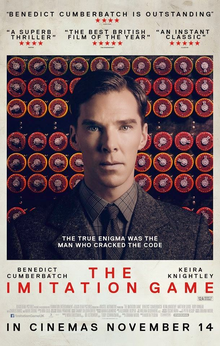
The film varies between three timelines: it begins and ends along the post-war line, where Turing lives alone and a policeman investigates him after a burglary at his home and Turing ends up accused and convicted of homosexuality (it was banned in England in its entirety until a partial decriminalization in 1967) and, faced with the possibilities of prison or chemical castration, he chose the latter, although he would die a year later, perhaps by suicide. In this line takes place the narration about the other two lines that Turing makes to the officer who interrogates him.
Another line is that of Turing in high school, where he had only one friend, Christopher Morcom, with whom he would fall in love but who would die of illness while still in his teenage years.
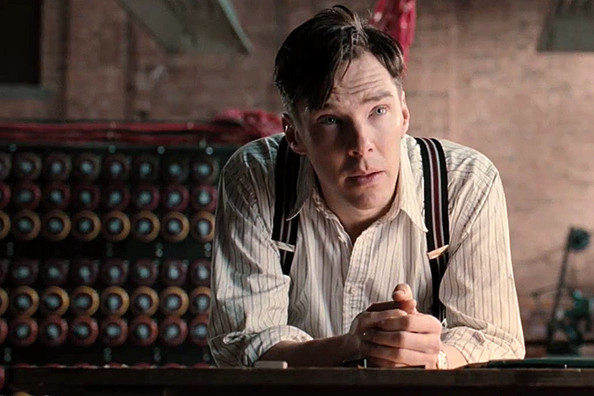
And the line that occupies the most screen time is that of Turing at Bletchley Park, the place chosen for the group that would decipher the German codes captured by radio. There, Turing, being very unsociable for lack of skills per se and also because of his eccentricity, does not make much progress in his work by doing it all alone, but he becomes interested in the only woman, a mathematician, who passed a cryptography test, and in record time too, and she teaches him a bit of social skills to get along better with the others and thus obtain their cooperation.
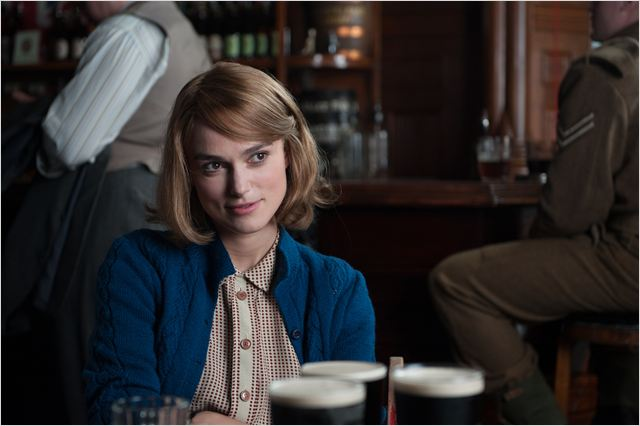
Joan Clarke is the name of this young woman, and she works with the team mostly clandestinely because of the way Turing convinced Joan's parents to let her go to Bletchley Park (work as one of the radio listeners) and her own reluctance to go against her parents' wishes, which would later also lead to her wanting to return home when they ask her to, and to avoid this Turing proposes to her.
The best of the film
The performances of Benedict Cumberbatch as Turing and Keira Knightley as Joan Clarke, but also the supporting actors play very good roles, among them Tywin Lannister, I mean Charles Dance as Commander Denniston, who appears few times but imposingly.
The show of how the dark British secret services worked/work, MI6 specifically, and how to do their job they have to become practically a parallel state that lies and deceives important members of the official state.
The suspense and mystery that most of the film revolves around, how to defeat Enigma.
What Joan says to Alan when they see each other for the last time in the film.
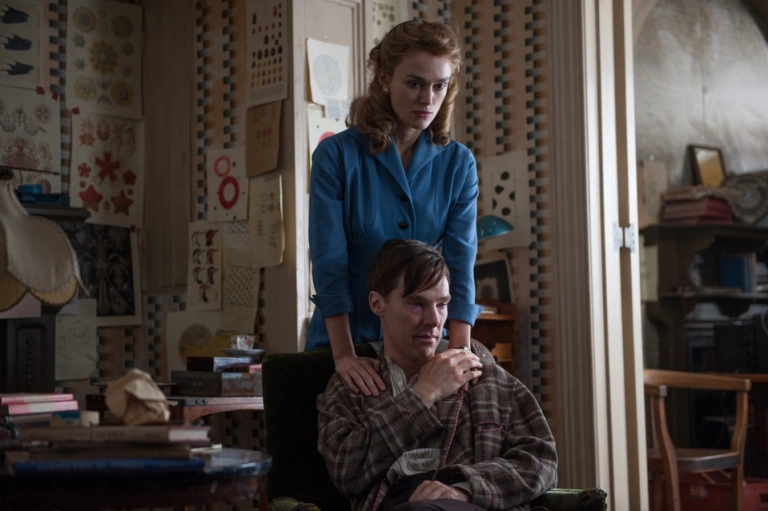
Worst
Joan's slapping of Alan seemed out of place to me; not part of what she said to him, which was her declaration of independence from the wishes of others to follow her own, but the mistreatment of Alan, both by the slap and what she says to him, as it was obvious (or should have been) that Alan had lied to her and that he was concerned for her safety when he told her he wanted her to leave.
The name of the movie in English, The Imitation Game. That "game" that would determine according to the real Turing whether something was a machine or a human by asking it questions, is not really of great importance in the movie. The Spanish title is better because of the opposite.
Conclusion
I really liked the movie, exceeding my expectations; I thought it was going to be a heavier and colder movie, but instead it focuses a lot on the human aspects of the story rather than the historical facts, and it also hooked me quickly, not that it took long to get going. So I recommend it and I think it will be good for anyone, it's not a niche film but a universalist one.
Warning: this is a work of fiction based on real events, not a biographical documentary, so there is much that is inaccurate or made up.
Translated with www.DeepL.com/Translator (free version)
Argumento
El código enigma es una película biográfica de Alan Turing, importante matemático y lógico en las ciencias de la computación que trabajó durante la Segunda Guerra Mundial para descifrar los códigos alemanes encriptados con la máquina Enigma, tarea que superaba las capacidades humanas aun en grandes números de personas: sólo una máquina podía vencer a otra máquina: el Bombe, una computadora, que en la película se llama Cristopher como el único amigo de Turing en la escuela.
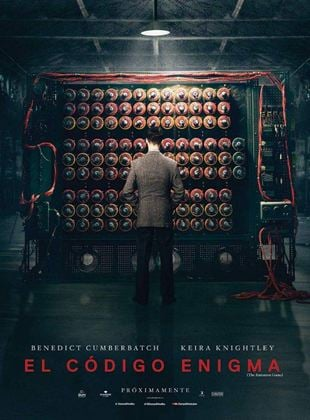
La película varía entre tres líneas temporales: comienza y termina por la línea postguerra, donde Turing vive solo y un policía lo investiga tras un robo en su casa y Turing termina acusado y condenado por homosexualidad (estuvo prohibida en Inglaterra en su totalidad hasta una descriminalización parcial en 1967) y, enfrentado a las posibilidades de prisión o castración química, eligió la segunda, aunque moriría un año después, tal vez por suicidio. En esta línea tiene lugar la narración sobre las otras dos líneas que Turing le hace al oficial que lo interroga.
Otra línea es la de Turing en la escuela secundaria, donde sólo tenía un amigo, Cristopher Morcom, de quien se enamoraría pero quien moriría por enfermedad aún en sus años teens.

Y la línea que ocupa mayor tiempo en pantalla es la de Turing en Bletchley Park, el lugar elegido para el grupo que habría de descifrar los códigos alemanes captados por radio. Allí, Turing, siendo muy poco sociable por falta de habilidades per sé y además por su excentricidad, no avanza mucho en su trabajo al hacerlo todo solo, pero se interesa en la única mujer, matemática, que pasó una prueba de criptografía, y en tiempo récord además, y ella le enseña un poco de habilidades sociales para que se lleve mejor con los demás y así obtenga su cooperación.

Joan Clarke es el nombre de esta joven, y trabaja con el equipo en su mayor parte de modo clandestino por la forma en Turing convenció a los padres de Joan para que la dejaran ir a Bletchley Park (trabajar como una de las radioescuchas) y la renuencia de ella misma a ir contra los deseos de sus padres, lo que luego también la llevaría a querer regresar a su casa cuando ellos se lo piden, y para evitarlo Turing le propone matrimonio.
Lo mejor de la película
Las actuaciones de Benedict Cumberbatch como Turing y Keira Knightley como Joan Clarke, pero también los secundarios hacen muy buenos papeles, entre ellos Tywin Lannister, digo Charles Dance como el Comandante Denniston, que aparece pocas veces pero imponentemente.
La muestra de cómo trabajaban/¿trabajan? los oscuros servicios secretos británicos, el MI6 específicamente, y cómo para hacer su trabajo tienen que convertirse en prácticamente un Estado paralelo que miente y engaña a miembros importantes del Estado oficial.
El suspenso y misterio sobre el que gira la mayor parte de la película, cómo vencer a Enigma.
Lo que le dice Joan a Alan cuando se ven por última vez en la película.

Lo peor
La cachetada de Joan a Alan me pareció fuera de lugar; no parte de lo que le dijo, que era su declaración de independencia de los deseos de los demás para seguir los suyos propios, sino el maltrato a Alan, tanto por el golpe como por lo que le dice, pues era obvio (o debería haberlo sido) que Alan le había mentido y que estaba preocupado por su seguridad cuando le dijo que quería que se fuera.
El nombre de la película en inglés, The Imitation Game. Ese “juego” que determinaría según el Turing real si algo era una máquina o un humano haciéndole preguntas, no tiene en realidad gran importancia en la película. El título en español es mejor por lo opuesto.
Conclusión
Me ha gustado mucho la película, superando mis expectativas; creí que iba a ser una película más pesada y más fría, pero en cambio se enfoca mucho en los aspectos humanos de la historia más que en los hechos históricos, y además me enganchó rápidamente, no es que tarde mucho en arrancar. Así que la recomiendo y creo que será buena para cualquiera, no es una película de nicho sino universalista.
Advertencia: esta es una obra de ficción basada en hechos reales, no un documental biográfico, por lo que hay muchas cosas inexactas o inventadas.
¡Ooooh, qué pedazo de película! Cine en estado puro. Sobre todo, en el ritmo y la atmósfera que podemos disfrutar. Llevada a cabo por la magnífica dirección de fotografía que hay en esta película. Qué lindo toparme con esta review. La amé. Tanto tu trabajo como el film.
Gracias!
Nada que agradecer. Tremenda elección para una review. Acertadísimo.